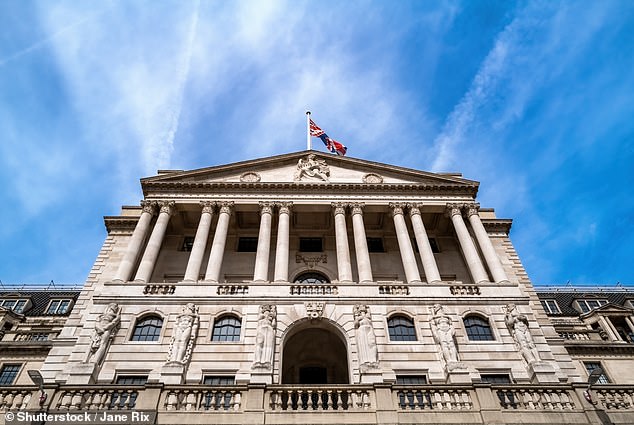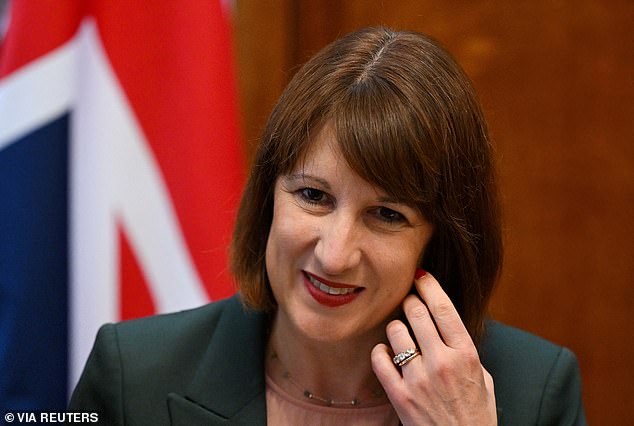Table of Contents
- Hopes of a rate cut next month are at stake
Chancellor of the Exchequer Rachel Reeves is under pressure to appoint a new member to the Bank of England’s rate-setting Monetary Policy Committee (MPC) after the process was delayed by the election.
This comes at a time when hopes of an interest rate cut as early as next month are hanging in the balance.
Traders are divided over when the bank will cut borrowing costs after the pound rose to its highest level against the dollar in a year on news the economy grew faster than expected in May.
Decision time: Rachel Reeves is under pressure to appoint a new member to the Bank of England’s rate-setting Monetary Policy Committee
Jonathan Haskel is scheduled to step down on August 31 after six years on the MPC.
The Imperial College London economics professor is considered a “hawk”, meaning he is more inclined to vote against rate cuts than more “dovish” members.
Unless a replacement is found soon, the MPC could be reduced to just eight members when it meets in September.
Gov. Andrew Bailey has the final say if the vote is tied.
Hopes that the base rate – 5.25 percent – would be cut at the next MPC meeting on August 1 flourished after inflation fell to the Bank’s target of 2 percent.
But Haskel is among those urging caution amid the risks posed by continued pressures that could push prices higher again.
“With the economy improving, the case for an immediate rate cut may have dimmed, but low inflation and a stronger pound mean an early rate cut remains highly likely,” said Gerard Lyons, chief economist at wealth manager Netwealth.

Meeting: Unless a replacement is found for him soon, the MPC could be reduced to just eight members when it meets in September.
“The Monetary Policy Committee is divided, but with a tendency towards easing,” he added, saying of government bonds: “So, this should help the government bond market.”
Haskel’s job, which would earn him £163,700 a year, was first advertised in March. The announcement said interviews would take place in early June and the appointment was expected to be finalised in time for the September meeting.
But that process is believed to have been put on hold following Rishi Sunak’s surprise decision to call an election.
Another hurdle could come from Parliament’s Treasury Select Committee, which is normally expected to question nominees before their term.
Sources say lawmakers are not expected to elect their committee members until September at the earliest.
Reeves (pictured), who has the final say on Haskel’s successor, has been encouraged by the positive reception the new Labour government has received in financial markets. The pound has risen three cents to $1.30 since its landslide victory.
The Office for National Statistics said gross domestic product (GDP) grew by a better-than-expected 0.4 percent in May.
And during the three months from March to May it expanded 0.9 percent compared with the previous three months, the fastest growth since January 2022. Government borrowing costs have also remained firm.
Another test of investors’ attitude towards the Government will come tomorrow, when the Bank sells £800m of government bonds.
The auction is part of the Bank’s plans to dismantle its money-printing programme known as “quantitative easing” or QE.
Under QE, the Bank bought government bonds from commercial lenders to boost the economy after the 2008 financial crisis.
This proved profitable for the Bank when the cost of borrowing money was almost free, but losses from the scheme, which is backed by the Treasury, mounted after interest rates soared following Russia’s invasion of Ukraine in 2022.
This means the taxpayer now has to pay more than £100bn, according to the Office for Budget Responsibility, the official watchdog.
Experts say the final figure could be even higher if interest rates remain high for longer.
A Treasury spokesman said the process to elect a new MPC member began in March but was extended when an election was called so that a new government could “decide on the appointment.”
DIY INVESTMENT PLATFORMS

AJ Bell

AJ Bell
Easy investment and ready-to-use portfolios

Hargreaves Lansdown

Hargreaves Lansdown
Free investment ideas and fund trading

interactive investor

interactive investor
Flat rate investing from £4.99 per month

eToro

eToro
Stock Investing: Community of Over 30 Million

Trade 212

Trade 212
Free and commission-free stock trading per account
Affiliate links: If you purchase a product This is Money may earn a commission. These offers are chosen by our editorial team as we believe they are worth highlighting. This does not affect our editorial independence.



